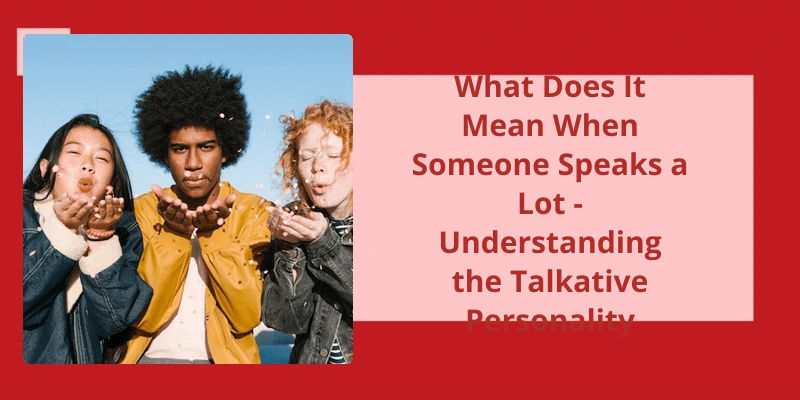Communication is a fundamental aspect of human interaction, helping us to convey ideas, thoughts, and emotions. While talking can be a great way to express oneself, it can also become problematic when done excessively. Excessive talking, also known as compulsive talking or chronic verbalization, is a behavior that involves an individual consistently talking in a manner that can be disruptive and overwhelming to others. This behavior can stem from various factors such as personality, mental health disorders, or personality disorders. Excessive talking can have negative consequences on the individual's social life as well as their relationships with others. In this article, we will explore what it means when someone speaks a lot and how excessive talking can impact individuals and those around them.
What Is Excessive Talking a Symptom Of?
This behavior can indicate narcissistic personality disorder, where the individual has an inflated sense of self-importance and a lack of empathy for others. They may dominate conversations and interrupt others to steer the discussion back to themselves. In some cases, excessive talking about oneself may also be a symptom of social anxiety disorder, where an individual may use self-disclosure as a way to cope with their anxiety in social situations.
Furthermore, excessive talking can also be linked to certain neurological conditions such as autism and Aspergers syndrome. Individuals with autism may struggle with social communication, making it difficult for them to understand social cues and maintain conversations. As a result, they may engage in monologues or repetitive speech patterns.
In some cases, excessive talking may simply be a personality trait or a habit. Some individuals have a natural tendency to talk more than others, which can be influenced by a variety of factors such as upbringing, culture, and socialization.
It’s important to seek professional help if excessive talking interferes with daily life or causes distress. Therapy, medication, and lifestyle changes may be recommended to help manage symptoms and improve overall well-being.
The Relationship Between Excessive Talking and ADHD
Some studies suggest that there may be a link between excessive talking and ADHD. Individuals with ADHD may experience impulsivity, which can cause them to talk excessively and interrupt conversations. However, excessive talking alone isn’t enough to diagnose ADHD, as it can also be a symptom of other conditions or simply a personality trait. A proper evaluation by a healthcare professional is necessary to diagnose ADHD.
Understanding the reasons behind over-talking can provide insight into how to address this behavior, whether it’s in ourselves or in others. Let’s explore the psychology behind over-talking, including causes and potential solutions.
What Does Psychology Say About a Person Who Talks Too Much?
Psychologists explain that individuals who talk too much may also be influenced by their need to be in control of their environment. This need for control can be caused by underlying issues such as insecurity or a fear of failure. Similarly, those who over-talk may have a need for validation from others. We’ve all experienced this before, where someone constantly speaks to be heard and also seeks validation for their thoughts and ideas.
Another factor that affects those who talk too much is their emotional state. People who’re in heightened emotional states, such as stress or anxiety, may tend to over-talk as a way of sorting through their emotions. This can create a sense of calm by allowing them to express what’s on their mind. However, this can also lead to oversharing, which may lead to misunderstandings or conflicts with others.
Furthermore, those who over-talk may not be able to accurately read social cues, leading them to talk too much without realizing the negative impact it can have on others. It’s important to recognize and understand social cues in order to effectively communicate with others and avoid misunderstandings or conflicts.
Finally, people who talk too much may have difficulty focusing their attention, leading them to jump from topic to topic or constantly interrupt others. This inability to focus their attention can be caused by various factors, such as ADHD or anxiety.
Over-talking can have many underlying causes. It can arise from social anxiety, a need for control or validation, emotional states, an inability to read social cues, or difficulty focusing attention. Understanding these underlying factors can help people identify and address over-talking habits, ultimately improving their relationships and communication skills.
How to Effectively Communicate With Someone Who Talks Too Much
When communicating with someone who talks too much, it’s important to be patient and understanding. Try to actively listen to the person and engage them in a conversation by asking open-ended questions. Use nonverbal cues, such as nodding and maintaining eye contact, to show that you’re listening. Make sure to also assert your own needs and boundaries by setting time limits or redirecting the conversation to the main topic. Finally, be kind and respectful in your approach, as talking too much may be a coping mechanism for the other person.
Conclusion
It’s important to approach individuals who talk excessively with empathy and seek professional help if necessary. Moreover, individuals who tend to talk a lot should work towards being aware of their behavior and make an effort to monitor their speech patterns to ensure they don’t burden those around them. Ultimately, by understanding the root of excessive talking and taking steps towards self-awareness, we can work towards creating healthier and more productive communication patterns.






